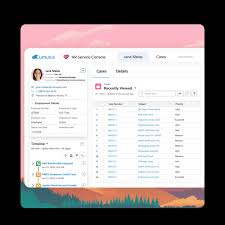As Millennials and Gen Z are now the dominant generations in the workforce, HR leaders face increasing pressure to support employees with caregiving responsibilities—now comprising about 73% of today’s workforce. At Salesforce, a global leader in AI and customer relationship management (CRM) solutions, Felicia Cheng, Director of Global Wellbeing, discusses the company’s approach to building a sustainable, supportive environment for working caregivers. HR Support With Salesforce.
Salesforce, with over 72,000 employees worldwide, competes aggressively for talent in a fast-growing tech industry. Despite its younger employee demographic, Salesforce also sees a steadily rising median age within its workforce, indicating strong retention. The company emphasizes a people-first culture and strives for a balanced, inclusive environment, with a global commitment to hiring more women and minorities. These efforts have cemented its reputation as a top employer globally.
Given the rise of stress and burnout in many workplaces, Salesforce has made employee wellbeing and mental health top priorities. Managers play a crucial role in this, acting as frontline supporters of employee wellness. To empower managers, Salesforce has implemented the “3Rs” strategy: role modeling, recognizing signs of distress, and referring team members to the appropriate resources. The company’s health and safety team also provides mental health first aid training, equipping managers and employees alike with tools to support mental health awareness. Additionally, Salesforce offers various wellbeing resources, encourages wellbeing breaks, and has meditation rooms and mindfulness zones in many offices.
HR Support With Salesforce
Recognizing the needs of its workforce’s caregivers has been especially important for Salesforce. As more employees progress in their careers and personal lives, the company supports a wide array of family care needs, from early childhood support to elder care, through carefully designed programs. Salesforce understands that work-related stress often extends beyond the office and that caregivers may struggle with focus or productivity if family needs go unmet. Additionally, as women typically take on more caregiving responsibilities, offering robust caregiver support also aligns with Salesforce’s goal to attract and retain more female talent.
For working caregivers, Salesforce has developed comprehensive family care programs. For example, employees with preschool-age children have access to discounted enrollment at the on-site Little Trailblazers child care center managed by Bright Horizons. Salesforce also offers a back-up care program, so employees can find temporary solutions for child or elder care needs when usual arrangements fall through. The company also recognizes that caregiving needs evolve as children grow, with 39% of back-up care used for school-age children last year and a 20% increase in use this year, underscoring the importance of offering benefits across the caregiving spectrum. For parents with college-bound children, Salesforce partners with College Coach, connecting students with former admissions counselors to navigate the college application process. This program has seen a 32% increase in use, indicating a significant impact.
Salesforce ensures that its caregiving benefits reach those who need them most through a range of communication channels, including Slack, newsletters, employee resource groups, and a dedicated benefits website that employees and family members can access. To further streamline support, the company offers Family Concierge from Bright Horizons, providing employees with a 1-to-1 specialist to create personalized care plans and assist with coordinating child care, elder care, camps, and more. This service has proven invaluable in enhancing access to and utilization of these resources, helping employees manage their family responsibilities alongside their professional commitments.
Through these programs, Salesforce exemplifies how companies can proactively support working caregivers, reduce absenteeism, and foster a more inclusive and resilient workforce.













